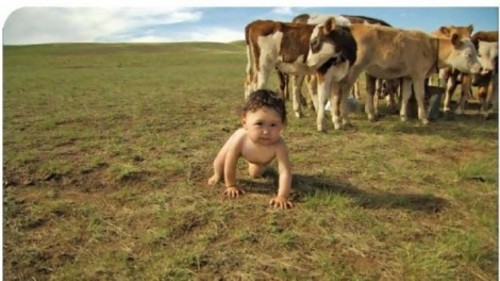Babies
Natal Habitat: Babies observes cultural differences—and overly precious cuteness.
By Scott Renshaw @scottrenshawWait, where was I? Right, there’s a film here with a lot to teach us about how the people we become is so often a factor of … Oh no, she just fell into the sandbox! The poor thing!
Here’s what’s both fascinating and frustrating about Babies: You can see what it’s trying to be, as well as what it feels it has to be. The way people raise their children varies as much as any other human behavior, and it can be fascinating to explore how cultures define their values by what they do and don’t do with those children. But it’s also hard to escape that when a movie spends 80 minutes just watching babies be babies, you’re going to end up wallowing in some schmaltz. A viewer will need to work to extract the educational merit from Babies, like mining National Geographic from beneath a thick layer of America’s Funniest Videos.
Director Thomas Balmes starts with a solid foundation, following four babies born in four different countries through the first year-plus of their lives. The two boys are Ponijao, born in Namibia, and Byarjargal, born in Mongolia; the two girls are Mari, born in Tokyo, and Hattie, born in San Francisco. Opting to bypass narration entirely, Balmes simply watches as they interact with parents and siblings, explore their surroundings and take their first steps.
The result is often terrifically interesting as anthropology. Predictably, there’s more new information from the segments dealing with the non-First-World cultures, as when we see Ponijao’s mother cleaning him with saliva like a cat and wiping his bottom with a corn cob, or Bayarjargal being swaddled so tightly you wonder how it’s possible for him to breathe. Yet we also see what constitutes “quality daddydaughter time” in one Japanese household, as Mari’s father multi-tasks his way through a toy-jingling/cell-phone-conversing moment, or sits Mari on his lap while he works at the computer. And if you think you might see some amusingly touchy-feely/New-Age-y activities involving Hattie and her San Francisco parents, you’d be correct.
Most compelling, though, is the subtext regarding how these children are shaped by the level of independence granted to them. We may be cringing as we see Bayarjargal in danger of being trampled by livestock, or having a rooster wander around what amounts to his crib, but it’s clear that he’s growing up in a culture where the parents don’t have the luxury of hovering over him—and as a result, he’s likely to grow up with a very specific personality and mindset. Contrast those moments with the reaction of the father during the abovementioned scene when Hattie pitches face-first into playground sand—or better yet, Mari’s response to problems getting wooden blocks to do exactly what she wants them to. As she flops over into hilariously overwrought tantrums every time her construction project fails, it’s hard not to find a cultural component in how these kids respond to having their will frustrated.
But, it’s hard not to recognize that for every scene that delivers a noteworthy idea, there are two that either repeat a similar point or exist primarily to tickle our “isn’t that adorable” reflex. Is it particularly noteworthy that Bayarjargal spends an afternoon unrolling and chewing up a roll of toilet paper? Or that Ponijao is fascinated by another child’s penis as a plaything? As the “learning to crawl” montage unspools, it becomes clear that maybe Balmes doesn’t have 80 minutes worth of insight to offer, and that he has no shame about filling the rest with stuff that would work just as well on the front of a Hallmark card.
Maybe that’s a savvy, pragmatic approach to documentary filmmaking, even if something like Babies can wind up feeling as cloying as it is perceptive. By playing up his chubby-cheeked cherubs, Balmes shows that he understands what most parents—and Mary Poppins—come to understand: A spoonful of sugar helps the medicine go down. Or, in this case, a spoonful of saccharine.
BABIES
Documentary
Rated PG
|
Scott
Renshaw:
|
Speaking of...
-
Glad You Asked: Holiday Weekend Edition
- Dec 21, 2012
-
More Frightening Than a Clown
Which is more frightening—Ronald McDonald and Bozo or Utah Senators Michael Waddoups and John Valentine?
- May 25, 2011
-
Men Behaving Badly
Do any men you know behave badly?
- May 11, 2011
- More »
More by Scott Renshaw
-
Film Reviews: New Releases for April 19
The Ministry of Ungentlemanly Warfare, Abigail, The Beast, Hard Miles, Sasquatch Sunset and more
- Apr 19, 2024
-
Faces of Salt Lake County book and portrait reception
Images and personal stories in a new book reveal local demographic diversity
- Apr 17, 2024
-
Feature film review: THE BEAST
A filmmaker's compelling ideas get a bit tangled in references to his creative influences.
- Apr 17, 2024
- More »
Latest in Film Reviews
Readers also liked…
-
Power Plays
Two satirical comedies explore manipulations and self-delusions by those with power.
- Aug 31, 2022






